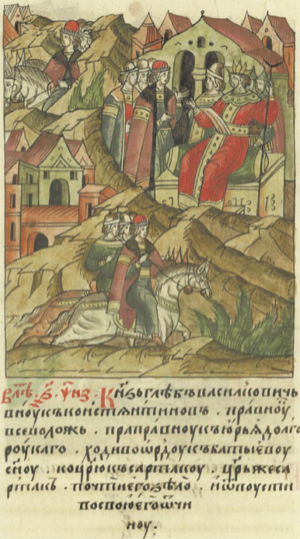سرتاق خان
| Sartaq | |||||
|---|---|---|---|---|---|
| Khan | |||||
 Sartaq Khan and Alexander Nevsky | |||||
| Khan of the Golden Horde Western Half (Blue Horde) | |||||
| التتويج | 1256 | ||||
| العهد | 1256–1257 | ||||
| سبقه | Batu Khan | ||||
| تبعه | Ulaghchi | ||||
| وُلِد | unknown | ||||
| توفي | 1257 | ||||
| الأنجال | Tughdua Qughchi Feodora | ||||
| |||||
| البيت | Borjigin | ||||
| الأسرة | Golden Horde | ||||
| الأب | Batu Khan | ||||
| الأم | Boraqchin Khatun of the Alchi-Tatar | ||||
| الديانة | Orthodox Christianity[1][2] | ||||
Sartaq (or Sartak, Sartach, بالمنغولية: Сартаг, تتارية: Сартак) Khan (died 1257) was the son of Batu Khan and Regent Dowager Khatun Boraqchin of Alchi Tatar.[3] Sartaq succeeded Batu as khan of the Golden Horde.
. . . . . . . . . . . . . . . . . . . . . . . . . . . . . . . . . . . . . . . . . . . . . . . . . . . . . . . . . . . . . . . . . . . . . . . . . . . . . . . . . . . . . . . . . . . . . . . . . . . . . . . . . . . . . . . . . . . . . . . . . . . . . . . . . . . . . . . . . . . . . . . . . . . . . . . . . . . . . . . . . . . . . . . .
Reign
In 1252, Alexander Nevsky met with Sartaq at Sarai. Alexander received yarlyk (license) to become Grand Duke of Vladimir in vassalage to the Kipchak Khanate. According to Lev Gumilev he became Sartaq's anda (sworn brother, akin to blood brother) and an adopted son of Batu Khan.[4]
His reign as khan of the Golden Horde was short-lived. He died in 1256 before returning from Great Khan Möngke's court in Mongolia, less than one year after his father, probably having been poisoned by his uncles Berke and Berkhchir. Sartaq was succeeded by Ulaqchi briefly in 1257, before his uncle Berke succeeded to the throne. It is not clear whether Ulaqchi was his brother or his son.
Sartaq's daughter Feodora (or Theothiure) was the wife of Gleb Vasilkovich, first Prince Belozersky of Beloozero and Rostov, a grandson of Konstantin of Rostov. Their daughter Maria Glebovna Belozerskaya married Daniel Alexandrovich (the son of Alexander Nevsky), and was the mother of Ivan Kalita.
See also
Books
- Grousset, René (1938). L'Empire des Steppes.
References
- ^ "Early in 1253 a report reached Acre that one of the Mongol princes, Sartaq, son of Batu, had been converted to Christianity", Runciman, p. 280. See Alexander Nevsky for details.
- ^ "Sartach examined the bible, and the cross with the image on it, putting some questions respecting both ; but our traveller was dismayed to hear nothing that favoured the report, upon which this painful journey had been undertaken, of his being a believer in the gospel. He never even seemed to refer to the subject, except in a tone of scoffing and derision. On inquiry, the sole ground of the rumour was found to be, that when christian merchants, many of whom passed this way, brought liberal presents, they were graciously accepted ; but when Mohammedans offered larger gifts, they met a welcome still more cordial." Travels of Marco Polo, by Hugh Murray, p. 70.
- ^ Rashid al-Din - Universal History, see: Tale of Jochids
- ^ Searching for an Imaginary Kingdom
External links
- Michael Marcotte: Marcotte Genealogy - Khan genealogy chart (shows part of Sartaq's family; Sartaq is called Sartuk Khan of the Blue Horde)
سرتاق خان House of Borjigin (1206–1634) توفي: 1256
| ||
| ألقاب ملكية | ||
|---|---|---|
| سبقه Batu Khan |
Khan of the Blue Horde and Golden Horde 1255–1256 |
تبعه Ulaghchi |
- Articles with hatnote templates targeting a nonexistent page
- Missing redirects
- Short description is different from Wikidata
- Articles containing منغولية-language text
- Articles containing تتارية-language text
- Pages using Lang-xx templates
- Year of birth missing
- 1256 deaths
- Khans of the Golden Horde
- Converts to Christianity from pagan religions
- 13th-century monarchs in Europe
- Mongol Empire Christians